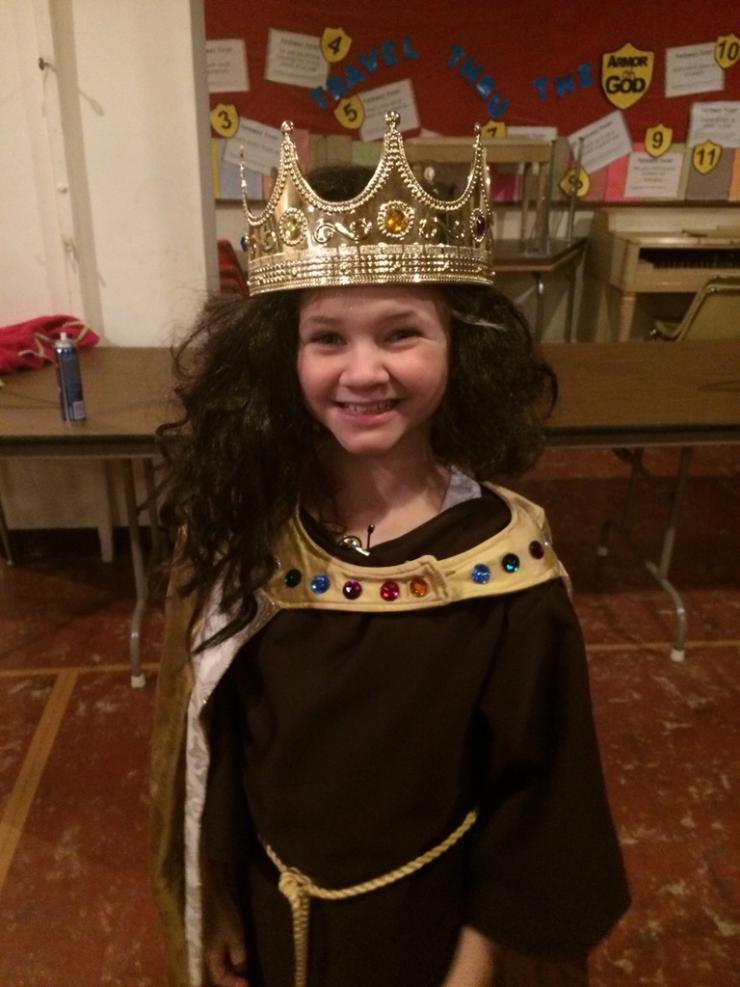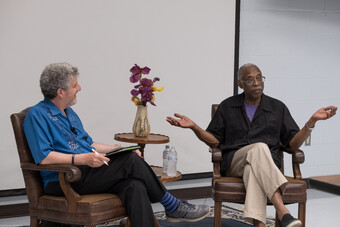Parenting and Playwriting
The Birth of an Actor at Bethlehem
Another year, another Christmas pageant. I admit it: I’ve become a hack. I have a reliable formula I’ll share with you with for the bargain price of reading to the end.
Okay, fine, I’ll tell you now.
Every year, I tell the story from a different player’s perspective. Last year, it was the Star of Bethlehem. The kids dressed as stars and talked about supernovas, black holes, and the birth of Christ. The year previous, the shepherds hogged the spotlight; they chatted about producing organic wool, environmentally friendly grazing practices, and the birth of Christ. This year, the play took place at the court of King Herod. It was a ballsy move, only I chickened out at the last minute and didn’t include King Herod slaughtering all the baby boys in Bethlehem. I felt our congregation wasn’t ready for that kind of blood bath on the altar.
Based on their behavior, the kids would have been totally up for it.
I hollered from the back of the church: ‘The court of Herod should be camp, not mumblecore! Sing out Louise!’
As soon as my daughter Lizzie read the script, she announced she wanted to play “Herod,” which gave me pause. Not because she’s a girl. My pageants always employ cross-gender casting. We have wise women and shepherdesses every year. The only person I won’t cross-gender cast is Jesus, because Jesus is played by a baby doll. I do not condone eight-year-olds holding live infants (see above re: blood bath). Come to think of it, I have no idea if that baby doll is a boy or a girl. Based on the anatomy of most baby dolls, it’s probably indeterminable. Anyway, gender wasn’t the problem.
The problem was that I don’t think directors, as a rule, should cast their children as leads. I think directors should cast their children in meaty second player parts, roles big enough to have some fun with but not big enough to get people talking. This rule is particularly important in small towns, but to be honest, it’s applicable everywhere. No matter how talented, casting your own kid as a lead gets eyes rolling. Yet denying Lizzie the opportunity to be considered for “Herod” seemed equally unfair, so we held auditions, and I asked a couple of observing parents to cast the part.
They chose Lizzie. She was thrilled, and I over-explained to everyone I met that “other mothers” cast her, while they walked away slowly, nodding politely.
It was fun for about three seconds. Upon studying the script at home, Lizzie immediately asked, “Can I change the words to make them sound better?”
Ah, every playwright’s favorite question. I used to think the desire to rewrite the script came from actors working in film and television, but no, I’m here to tell you that it’s braided into the very DNA of the young actor. The actor has a primal, almost atavistic instinct to take ownership of the material by changing the words. This impulse may be beat out of them in drama school, but it’s there from the beginning.
“No, honey. You cannot change the words. I worked very hard on the words. I am, you know, a professional wordsmith!”
“I just think it would sound less awkward,” she stubbornly replied.
“Go to your room.”
It got worse from there. It turns out Lizzie is the worst kind of actor: utterly insecure but impervious to direction. I tried to help her break up the text and make distinct choices with different lines. She stonewalled me: “Herod wouldn’t do that.” I suggested gestures she might use for various visual images to help her remember the text.
“That makes me feel weird,” she protested.
“Then come up with your own.”
“I can’t think of anything,” she said, throwing down her script and bursting into tears.
“Go to your room.”
In proper rehearsals at the church, she was better behaved but not particularly good in the part. Whatever spirit she displayed in the audition completely disappeared. Uncomfortable in her body in normal circumstances, on-stage she became a total spazz, distractedly flailing her arms at random players. She remained oblivious to her relationship to the audience throughout, choosing to either turn her back completely or stare at her shoes. She seemed incapable of making a diagonal cross and for some inexplicable reason began mumbling her lines. I hollered from the back of the church: “The court of Herod should be camp, not mumblecore! Sing out Louise!”

On the day of the show, I braced myself for the worst. She might remain oblivious to the awfulness of her performance, but the other parents wouldn’t be. I would go down in church history not as the director who cast her own kid as the lead, but as the director who cast who own kid without any talent as the lead.
Suffice it to say, Lizzie’s “Herod” was not a master class in acting. Juilliard isn’t going to come calling anytime soon. She remained awkward in her movements and struggled with enunciation to the bitter end, but she was also pretty damn effervescent. She made creative, varied choices. She owned the language. She had fun. She was, in short, a delight.
At the cookie and juice feast afterwards, strangers feted and cheered her. They shook her hand and told her she was great. I beamed. In the car on the way home, I asked Lizzie how she thought it went and she said, “I liked performing, but I got tired at the party. All those compliments were exhausting.”
Oh, actors.
Happy Holidays, dear readers. I hope the New Year brings you much delight and an exhausting number of compliments.






Comments
The article is just the start of the conversation—we want to know what you think about this subject, too! HowlRound is a space for knowledge-sharing, and we welcome spirited, thoughtful, and on-topic dialogue. Find our full comments policy here
I adore reading these! Get 'em, Mama T!
Delightful essay indeed! But I was so hoping the punch line would be that you snuck in "King Herod's Song" from JCS. From the way you describe your daughter (and the above picture) I just KNOW that she would have knocked the following out of the park:
"Prove to me that you're no fool...
Walk across my swimming pool!
Do that for me
And I'll let you go free
C'mon King of the Jews!"
P.S. One thing you'll never hear me (or I suspect any other playwright) say: "I like writing, but all of the compliments are exhausting"!
:)
Thanks for this delight!